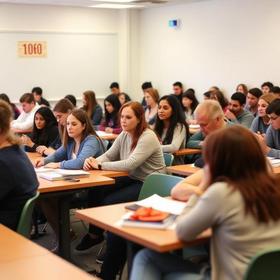Remedial Math Gets a New Look at Community Colleges Nationwide
As community colleges across the United States strive to improve dismal completion rates, one factor stands out as a stark obstacle for degree-seeking students – remedial math. Many students need remedial math classes after taking placement tests for community college. However, semesters of remedial math prove to be costly and time-consuming for those students. Sadly, many community college careers both start and end with remedial math. Fortunately, schools nationwide are devising new systems to give students the math instruction they need without jeopardizing their ability to earn the desired degree.
New Math Pathways Match Instruction to Needs
In California, community colleges are trying a new approach to remedial math classes. Instead of requiring students to take courses in subjects they may never need or use, math classes are customized to a student’s specific major and area of interest. For example, aspiring engineers may need remedial algebra to prepare appropriately for the math required in their degree program. However, English or history majors might be just as well suited to a class in statistics that teaches basic math concepts quickly and effectively.
According to a report in the Sacramento Bee, at least 16 community colleges across the state have adopted this approach to remedial math – so far, with great success. The publication reports that students in the new pathways program are completing math classes at a rate two to four times higher than the traditional curriculum. Similar models are even being considered at community colleges nationwide as the theory of matching math to significant requirements takes hold.
Community colleges in Virginia plan to begin matching math requirements to the specific academic paths of students by next year, according to U.S. News and World Report. Students pursuing degree programs in the STEM disciplines (science, technology, engineering and mathematics) will still be required to follow the traditional math sequence. However, students in other areas of study will be able to fulfill math requirements through less rigorous coursework.
“These students are currently required to master math skills that are more advanced than what they will ever need on their jobs and more advanced than what they will need to function successfully as an adult citizen,” Frank Friedman, co-chair of the math re-design team and president of Piedmont Virginia Community College, told U.S. News.
Unfortunately, despite the promising potential, the new program is in jeopardy in California. The Sacramento Bee reports that some educators in the state, particularly those at four-year colleges and universities, don’t like the idea of limiting math education for some college students. If the four-year schools in the state refuse to accept these math courses as a demonstration of college readiness or for transfer, it is unlikely the new pathways program can survive in that state.
This video reports on the need for remedial math at Pima Community College in Tucson, Arizona.
50 Texas Community Colleges Adopt “Mathways”
While California continues to mull over the benefits and drawbacks of its new pathways program, Texas is moving full-steam ahead with a similar plan. All 50 community colleges in the state have endorsed a new program dubbed “Mathways,” which is designed to revamp remedial math completely. The multi-year program began this fall in a handful of the state’s community colleges, eventually expanding the program to all 50 schools.
According to Inside Higher Ed, the program will place students interested in degree programs requiring higher-level math on an algebra-based development course. Other students can meet their basic math requirements through less rigorous classes, such as statistics. If these students decide to shift gears and pursue a more math-intensive track, bridge courses will be available. College officials in the state told Inside Higher Ed there will be significant benefits in making this a statewide program, including the ability to leverage state policy in this area.
“Math Redesign” Comes to Boston Schools
Community colleges in the Boston area are also adopting a new approach to remedial math that has been gaining steam nationwide. Known as “Math Redesign,” schools are offering students the chance to bone up on their math knowledge using self-guided online courses. Students work together in an actual classroom, with a teacher on hand to offer assistance and answer questions. However, students can work independently, ensuring they fully grasp one concept before moving on to the next.
The program is currently offered at a handful of Boston area schools via a grant from the U.S. Department of Labor, according to Boston.com. The program began at Middlesex Community College in 2011, and college officials hope to continue to expand the program over the next few years. The program has grown quickly in the locations currently offered as more students tune into the many benefits the individualized program offers.
This video shows how Middlesex Community College in Bedford, Massachusetts, handles math assessments.
Remedial math may be a necessary evil in the community college system, but educators find it does not need to be a significant obstacle to college completion. By looking at remedial math in different ways and catering programs to the unique needs of students, those students can get the math help they need without classes interfering with their degree goals. These programs serve as examples to other community colleges looking for innovative ways to re-design remedial programs to promote student success.
Questions? Contact us on Facebook and Instagram. @communitycollegereview
#RemediasMathReform #CommunityCollegeSuccess #MathPathways #HigherEdInnovation #StudentSuccess















